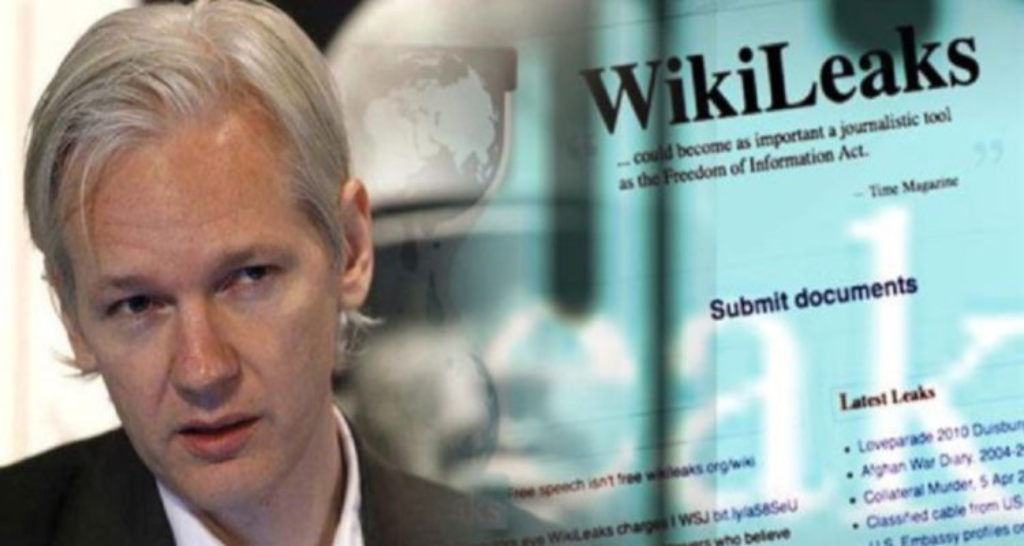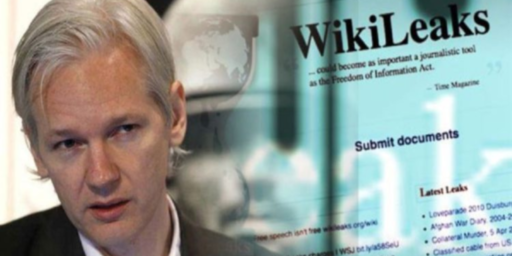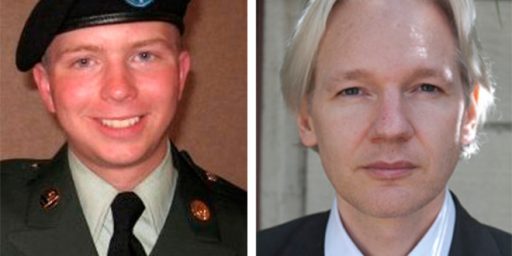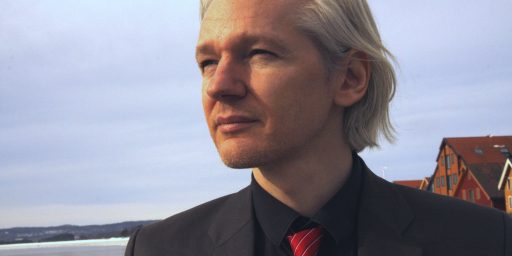Julian Assange Indicted On Additional Counts Alleging Violations Of Espionage Act
Wikileaks founder Julian Assange has been indicted on seventeen counts under the Espionage Act arising out of his role in the Chelsea Manning affair.

Wikileaks founder Julian Assange, who was charged in early April with computer hacking in connection with the data that was made available to Wikileaks by Chelsea Manning while she served as an intelligence analyst in the U.S. military, has been charged with seventeen violations of the Espionage Act, thus making the case against him incredibly serious:
WASHINGTON — Julian Assange, the WikiLeaks leader, has been indicted on 17 counts of violating the Espionage Act for his role in obtaining and publishing secret military and diplomatic documents in 2010, the Justice Department announced on Thursday — a novel case that raises profound First Amendment issues.
The new charges were part of an expanded indictment obtained by the Trump administration that significantly raised the stakes of the legal case against Mr. Assange, who is already fighting extradition proceedings in London based on an earlier hacking-related count brought by federal prosecutors in Northern Virginia.
The charges are the latest twist in a career in which Mr. Assange has morphed from a crusader for radical transparency to fugitive from a Swedish sexual assault investigation, to tool of Russia’s election interference, to criminal defendant in the United States.
Mr. Assange vaulted to global fame nearly a decade ago as a champion of openness about what government secrets do. But with this indictment, he has become the target for a case that could open the door to criminalizing activities that are crucial to American investigative journalists who write about national security matters.
The case has nothing to do with Russia’s election interference in 2016, when Mr. Assange’s organization published Democratic emails stolen by Russia as part of its covert efforts to help elect President Trump. Instead, it focuses on Mr. Assange’s role in the leak of hundreds of thousands of State Department cables and military files by the former Army intelligence analyst Chelsea Manning.
Justice Department officials did not explain why they decided to charge Mr. Assange under the Espionage Act — a step also debated within the Obama administration but ultimately not taken. Although the indictment could establish a precedent that deems actions related to obtaining, and in some cases publishing, state secrets to be criminal, the officials sought to minimize the implications for press freedoms.
They noted that most of the new charges were related to obtaining the secret document archives, as opposed to publishing them. In the counts that deemed the publication of the files a crime, prosecutors focused on a handful of documents revealing the names of people who provided information to the United States in dangerous places like war zones.
“Some say that Assange is a journalist and that he should be immune from prosecution for these actions,” John Demers, the head of the Justice Department’s National Security Division, said at a briefing with reporters. “The department takes seriously the role of journalists in our democracy and we thank you for it. It is not and has never been the department’s policy to target them for reporting.”
But Mr. Assange, he said, was “no journalist.” Mr. Demers accused him of conspiring with Ms. Manning to obtain classified information. “No responsible actor, journalist or otherwise, would purposefully publish the names of individuals he or she knew to be confidential human sources in a war zone, exposing them to the gravest of dangers,” he said.
(…)
The Obama administration had also weighed charging Mr. Assange, but rejected that step out of fears that it would chill investigative journalism and could be struck down as unconstitutional. A Justice Department official declined to address whether there was any new evidence that had come to light recently or whether the Trump administration had simply decided to take a step the Obama administration had shied away from.
The three charges that squarely addressed Mr. Assange’s publication of government secrets were focused on a handful of files that contained the names of people who had provided information to the United States in dangerous places like the Afghanistan and Iraq war zones, and authoritarian states like China, Iran and Syria.
The evidence laid out in the indictment against Mr. Assange mapped onto information presented by military prosecutors in the 2013 court-martial trial of Ms. Manning. Prosecutors in her case also alleged that her actions endangered the people whose names were revealed in the documents when Mr. Assange published them, though they presented no evidence that anyone was killed as a result.
A Justice Department official declined to say whether any such evidence now exists, but stressed that prosecutors would need to prove in court only what they say in the indictment: that publication put people in danger.
More from The Washington Post:
WikiLeaks founder Julian Assange was charged Thursday with violating the Espionage Act by seeking out classified information, an escalation of the Trump administration’s pursuit of leakers that could have major First Amendment repercussions for news organizations.
An 18-count federal indictment alleges that Assange worked with a former Army intelligence analyst to obtain and disseminate secret documents — actions similar to reporting work at many traditional news organizations. The U.S. government, though, sought to distinguish the anti-secrecy advocate from a reporter.
“Julian Assange is no journalist,” said John Demers, the assistant attorney general for national security. He said Assange had engaged in “explicit solicitation of classified information.”
Press freedom advocates said the distinction being drawn by prosecutors offers little protection for journalists. Noted media lawyer Floyd Abrams said that Assange may be a “singularly unattractive defendant in a lot of ways” but added that the indictment “does raise deeply threatening First Amendment issues for journalists who cover national defense, intelligence activities, and alike.”
Bruce Brown, executive director of the Reporters Committee for Freedom of the Press, said in a statement that the indictment was “a dire threat to journalists.”
The new indictment expands on a conspiracy charge previously brought against Assangeover his interactions with Chelsea Manning, the former Army intelligence analyst who shared hundreds of thousands of classified war logs and diplomatic papers with WikiLeaks.
Assange, 47, who was arrested last month in London and is fighting extradition to the United States, faces a maximum of five years in prison under that conspiracy charge. Each alleged violation of the Espionage Act carries a potential 10-year prison sentence.
Prosecutors alleged in the new indictment that Assange and WikiLeaks “repeatedly encouraged sources with access to classified information to steal it” and give it to the anti-secrecy organization, posting on its website a “most wanted” list for leaks organized by country and saying the documents must be “likely to have political, diplomatic, ethical or historical impact on release.” The indictment said Manning responded to that call, downloading nearly four complete government databases of war reports, Guantanamo Bay detainee assessments and State Department cables and turned them over to WikiLeaks.
The disclosures contained the names of local Afghans and Iraqis who had given information to the United States, as well as other confidential sources for the U.S. government, according to the indictment, and that “put innocent people in grave danger simply because they provided information to the United States,” revealing information that “would allow enemy forces in Iraq and elsewhere to anticipate certain actions or responses by U.S. armed forces and to carry out more effective attacks.”
The new charges carry potential consequences not just for Assange but also for others who publish classified information, and they could change the delicate balance in U.S. law between press freedom and government secrecy. The government’s move also raises fresh questions about whether the British courts will view the new charges as justified and worthy of extradition.
“This just became one of the most important test cases for press freedom, even if we all agree that Assange isn’t the press,” said Steve Vladeck, a professor at the University of Texas School of Law. “Factually, there’s a world of difference between what Assange is accused of and what professional journalists do. The tricky part is the theory on which he’s being prosecuted doesn’t draw that much of a legal distinction between them. One does not need to be sympathetic to Assange to be worried about a sort of precedent whereby it is not just unlawful but routinely prosecuted for third parties to publish classified information.”
Prosecutors tried to distinguish Assange from a traditional publisher by accusing him of giving Manning “direction” and “explicitly” seeking classified material. They alleged, as they had previously, that Assange agreed to help Manning crack a password in a bid to help cover their tracks — though the effort was apparently unsuccessful.
Barry Pollack, a U.S. lawyer representing Assange, said the hacking charge was a “fig leaf” for a case that endangers press freedom.
“These unprecedented charges demonstrate the gravity of the threat the criminal prosecution of Julian Assange poses to all journalists in their endeavor to inform the public about actions that have been taken by the U.S. government,” he said.U.S. Attorney G. Zachary Terwilliger said Assange was “not charged simply because he is a publisher” but rather for “publishing a narrow set of classified documents in which Assange also allegedly published the unredacted names of innocent people who risked their safety and freedom to provide information to the United States and its allies.
At the moment, Assange remains in British custody after having been arrested when his years-long efforts to avoid extradition to either the United States or Sweden, where he is still the focus of accusations that he raped a woman prior to going into hiding in the United Kingdom, ended after he left the Ecuadoran Embassy after many years of hiding out there. Presumably, the United States is going to move forward with an extradition effort to get Assange on U.S. soil so that the case itself can move forward. This effort may be complicated, though, by the nature of the charges against Assange and the potential penalties, which at least theoretically could include the death penalty. Additionally, the U.S. will be competing with Sweden, who also wants to see Assange extradited there to at least face questioning with regard to the nearly decade-old charge that he raped a woman while visiting Sweden. At the very least, it’s likely that it will be several weeks, and perhaps longer, before these extradition matters are sorted out.
Once the extradition issue is resolved, and presuming that he ends up in the United States, Assange will be brought before the Federal Court in which he was charged and the march toward trial will begin. Given that he was charged in the Eastern District of Virginia, which is famous for its so-called “rocket docket” that moves both civil and criminal cases forward at a faster pace than many other Federal District Courts, its likely that he would face trial sometime within the next year unless the parties and the Court agree to a later trial date for some reason.
As for the new charges against Assange, they all relate to the incidents surrounding Chelsea Manning’s accessing and providing to Wikileaks intelligence files regarding American military, diplomatic, and intelligence matters around the world. While Wikileaks and Manning both claimed at the time that Manning operated alone without direct, the government alleges that Wikileaks generally and Assange particularly specifically directed Manning regarding what information to access and steal and how to transmit it to Wikileaks.
What is most significant about these charges, though, is that, in addition to being charged with directing and aiding Manning in the theft of intelligence data, Assange is also charged with publishing that information on the Wikileaks website where it could be accessed by anyone in the world. This aspect of the indictment has already begun to raise serious First Amendment concerns in that it theoretically could also be applied to mainstream journalists who publish classified information provided to them by sources. To date, that has never happened before in the United States, there are those who fear that these charges represent a crossing of the Rubicon that could lead to similar action against mainstream journalists and news outlets in the future. I’ve written about this issue in the past, and it’s really a topic that deserves a post of its own.
Suffice it to say, though, that these concerns are well-placed and that these charges against Assange need to be watched carefully due to the precedent they could set for this or future Administrations that display open hostility toward critical press coverage. We already saw in the Pentagon Papers case more than 40 years ago that such a thing could happen, and while that effort by the Nixon Administration failed, that wouldn’t necessarily stop a President clearly opposed to Freedom of the Press like Donald Trump from using a blunt instrument like the Espionage Act against perceived enemies in the news media.
Leaving that issue aside, these charges against Assange are serious and could lead to him spending decades in prison if he is convicted. It will be interesting to watch all of this unfold to say the very least.
Here is the original indictment that was filed against Assange:
United States v Assange Ori… by on Scribd
And here is the new Superseding Indictment:
United States v. Assange Su… by on Scribd




The chilling effect on “journalists” will be more in the area that the IG is likely to report on FBI agents and officials accepting bribes, such as sports tickets and such, from journalists. That move the journalist from simply publishing information from a voluntary source to conspirator, if not inducer. There’s the NY Times ‘honeypot’ reporter Ali Watkins who compromised the Senate Intel committee with sex for secrets.
@JKB: Why aren’t you drooling on about the dozens of times Trump expressed love for an organization the creator and leader of which his administration has just charged with multiple violations of the Espionage Act?
You brain-dead cultists may want to stuff that down the Memory Hole, but those of us conversant with reality will remember.
I continue to maintain that Chelsea Manning never served as an intelligence analyst in the U.S. military. It’s just a bizarre rewriting of history to pretend otherwise.
Assange is an unprincipled opportunist. He won’t be free again anytime soon. No loss.
@Mike: Assange has to finish his 50 week sentence in England. I’m hoping he gets extradited to Sweden after that. I doubt Sweden would send him on tho the US because of death penalty issues. Besides by the time the Swedish trial is over and a possible sentence served the US probably won’t want him.
Assange, through wikileaks, worked to get Trump elected by selectively leaking information that harmed the Clinton campaign.
He must be so stunned that Trump is doing this to him.